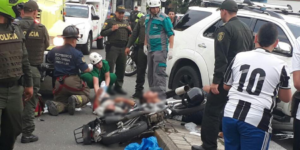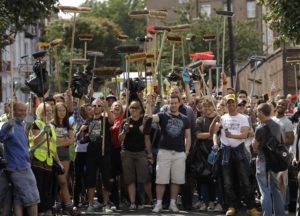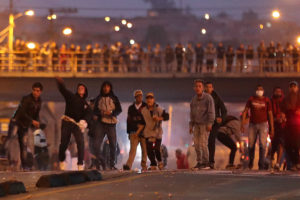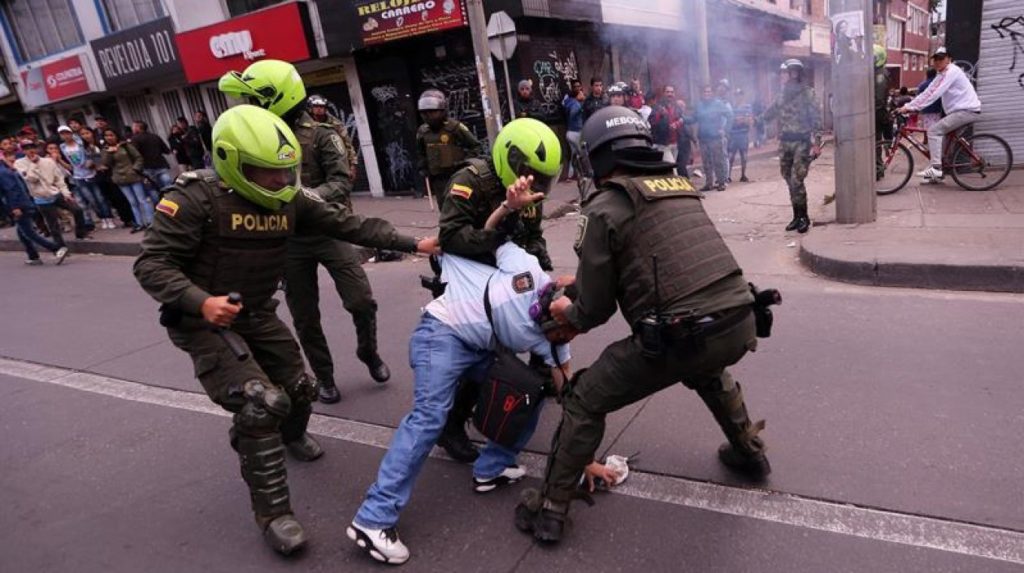The fundamental tenets of the social contract are going unmet in Colombia, and people here must simply cope
The nature of justice – it is a mean or a compromise between the best of all, which is to do injustice and not be punished, and the worst of all, which is to suffer injustice without the power of retaliation; and justice, being at a middle point between the two, is tolerated not as a good, but as the lesser evil.
– Glaucon, The Republic
***
On the subject of society, British Prime Minister Margaret Thatcher once said “…and who is society? There is no such thing. There are individual men and women, and there are families.” It was part of an argument she was making against socialism and what she claimed was a growing sense of entitlement within the welfare state. But really, “there is no such thing” as society?
Thatcher couldn’t have been seriously talking about the country over which she governed. That would have been an insult to the highest degree. The late Iron Lady must have forgotten what the term “society” means, or never knew what it meant to begin with. But she can be forgiven for such a transgression. It is a luxury of those who have spent all their days in what can rightfully be called the Developed World for taking such things for granted.
She also mustn’t have remembered that it isn’t a government and its laws that define a society; those things merely reflect and accommodate for it. A functioning society, and the culture it breeds, is grounded in a commonly held sense of values, of civility, civic duty, a common decency, a sense that you are a part of something bigger than yourself. Not in any bellicose or mean-spirited way (although sometimes so), and that everyone, and everything, is made better by the small everyday courtesies and favours we do for one another – not because we feel we must do, but because we feel we ought to.
When Thatcher struck up her poshest and most self-righteous tone to knock down what she referred to as society, of course she was talking about 1980s-era Britain. Her words ring through the decades; they may or may not have withered and died in the country in which they were spoken. But one might suppose that they’ve found a haven of relevance in a place like present-day Colombia.
That we live in a society is a given, and we follow an innumerable set of rules as naturally and unconsciously as we breathe while we’re asleep. The denizens of a society have equally unconsciously entered into a contract they can’t see or touch – it is known as the social contract. Social contract theory dates back to antiquity, and anyone who lives in the midst of a people with a common language, similar attitudes, customs and culture has likely entered into this social contract.
The idea is simple – we are all in tacit agreement that we all benefit if we surrender certain rights and freedoms in exchange for things like stability and safety. If we play by the rules, we all benefit, and one of those benefits is that we can view one another as allies instead of enemies. We can generally trust one another. We greet our neighbours as friends more often than we are suspicious of them. In this manner we all contribute in our own way, and this makes our lot better.
Societies are the result of compromises, and the social contract provides the framework for how people interact with each other, and with authority. Individuals who live in a social structure gain protection from those who break this unspoken contract, namely, whose who may seek to harm you or your loved ones, or take from you which is yours, by break-and-enter, mugging, or by threat of blade or bullet.
What happens to society, in a place like Colombia, where too many people break the social contract? Where too few want to contribute to groupings bigger than their immediate families – the police also excluded – because doing so leaves you vulnerable and exposed? A society that rewards those who break the law and castigates those who obey it? Where trusting your neighbour is unwise and naïve? Where letting your guard down around strangers is dando papaya?
Related: Act Like Ya Know, Colombia!
The results range from the tragic to the everyday. But pay attention and you’ll notice the cracks everywhere. From the litter in parks and pathways, often piled up just next to trash bins, to the way in which people walk down the crumbling streets and eye each other with suspicion (yet so absentmindedly that they tend to bump into one another with comical frequency).
To not do so would be at one’s own folly, and for good reason. People here take precautions against harmful or threatening circumstances, sure. But most Colombians treat crime like the weather: something that you can prepare for, but not something that can ever be controlled. Like the rain and the atrocious state of public transport, crime is something you just have to endure.
 Two motorcycle thieves are gravely wounded after a motorist they tried rob ran them over with his vehicle in Medellin, on March 24.
Two motorcycle thieves are gravely wounded after a motorist they tried rob ran them over with his vehicle in Medellin, on March 24.
There is the hustling, the hanging around and the passing through, but there is no sense of community, and it might be argued that in Colombia, the social contract is broken – or there never was one to begin with.
Why? Because everyone has zero confidence, and even open distrust of, what passes for “law enforcement” (a term that you need to use very loosely to refer to the police here). Everyone knows that the vast majority of crimes, from shoplifting to murder, and everything in between, go unpunished. Official crime statistics are released every few months, but the figures can’t ever be trusted. The jaw-dropping incompetence of Colombian police, not to mention the corruption that pervades every level of the institution, means that scores of crimes go unreported – why would you even bother? – so the official stats on muggings, rape, theft, extortion, scams of all kinds, and even homicide, are probably much lower than what’s really going on in towns and cities across the country.
A Breach of the Social Contract
That is the state of Colombia, the broken society. You can’t trust anyone here. Let your guard down and you’ll be conned or scammed or robbed of your money and possessions. Run for your life – every man and woman for themselves. Too many even cheat and steal from their own family.
Here at MiKo, we’re sometimes accused of being a bunch foreigners whose commentary is written from a point of assumed superiority, or as racist, or both. We always get a chuckle out of this. Such accusations might be valid if it weren’t for the fact that not all our contributors are foreign (nor do all writers here hail from the same race or gender). So if the last couple splashes of thought have offended you as xenophobic or anti-Colombian, it’s instructive to consider the words of the fringe (and now former) presidential candidate Juan Manuel Galán.
Like his assassinated father, Galán is a fierce critic of the system of patronage and clientelism that not only persists in Colombia’s political and business spheres, but is also ingrained in the culture.
“It’s a [system] about favours and not about rights. It’s a policy of personal transaction to see who holds the levers of influence, of who knows who, to achieve what I want to achieve. I’m referring to businesspeople, to politicians, to citizens. In all sectors of our society there is a clientelist mentality, it is a yoke, it’s a weight that we carry … that generates the cultivation of corruption,” he told RCN Radio on October 3rd last year.
What we can deduce that is some fundamental tenets of the social contract are going unmet. Someone is squelching on their bet and everyone knows it. Most have done their part in surrendering the rights and freedoms that were supposed to keep them safe, either willingly or because there is no alternative, but the protection they were promised never came.
Related: Colombia’s Fictitious Justice System
If we don’t feel unsafe, we remain on our guard, and if we are hurt or stolen from, we collapse inward, and with no trace we suspect our neighbours, we suspect everyone around us. We’re told that in Colombia “these things happen” and our rage is blunted. Justice is something that happens elsewhere. Cold reality crushes hope, and we all learn to play the victim.
Social Strife and Citizen Response
Disturbances, riots, violence and social strife can happen anywhere, and Colombia is no exception. But the measure of a strong and functioning society is not what bad things happen, but how ordinary people respond to them.
Mass demonstrations broke out in London in 2011 after a man who was alleged to have been carrying a handgun was shot dead by police. They quickly spread to other British cities and led to violent clashes between the police and groups of protestors. The protests grew in number and intensity, and descended into widespread riots and looting, with homes, infrastructure and vehicles being torched, while shops and businesses were ransacked and destroyed. The looting and violence gained worldwide attention, as the week-long chaos in August of that year left five people dead, dozens injured, and caused an estimated £200 million (786 thousand million pesos) in property damage.
Even before the violence and rioting had come to an end, something incredible happened. Hundreds of people turned up in the most affected communities across London and other cities with brooms and binbags in hand, and began cleaning up the destruction and debris.
No official call for volunteers was made, rather, it was a citizen-initiated social media campaign driven by the Twitter hashtag #riotcleanup that helped direct those willing to take part to go to the areas where they were most needed.
 Hundreds of Londoners turn up to help in the clean-up effort following riots and looting that took place the night before, in August, 2011.
Hundreds of Londoners turn up to help in the clean-up effort following riots and looting that took place the night before, in August, 2011.
“I feel impassioned to help in any way I can”, said student Athena Stravrakis, 24, a resident who gathered with around 300 others at Clapham Junction in south London, told the Guardian at the time. “It is inspiring. There is a community here that is not going to stand back”.
A Tale of Two Cities
Similar riots took place in Bogota’s impoverished south in February of this year. Riots and unrest broke out after a small supermarket chain was accused by the Public Prosecutor’s Office of laundering money for the former FARC guerrillas. Groups of looters prowled neighbourhoods in the sector of Ciudad Bolivar on February 21, indiscriminately targeting businesses not associated with any criminal investigations.
Police were pelted with rocks and other object by bands of delinquents, and they responded by firing tear gas. More than 55 people, mostly young men, were arrested and at least six policemen were injured. The following day, authorities imposed an overnight curfew and liquor sales ban in an attempt to quell the looting and violence. While the curfew and liquor ban lasted five days in the most affected communities, the nearby city of Soacha kept the curfew in place until March 12.
But local business owners and merchants didn’t take the riots lying down, and many stood guard and defended their shops from roaming bands of looters and vandals. “We are armed with sticks and machetes to defend ourselves”, one shop owner was quoted as saying at the time.
 A group of youths throw rocks and other debris at riot police in the Ciudad Bolivar sector of Bogota in February this year.
A group of youths throw rocks and other debris at riot police in the Ciudad Bolivar sector of Bogota in February this year.
The violence eventually subsided, but unlike in Britain, no citizen-driven clean-up effort was organized. But to be fair, there were reports of people in the area coming out in force with baseball bats and other weapons to help their neighbors and local business owners defend against the gangs of criminals out looking for trouble.
***
The comparison made here is between a city that has what could be called a functioning society, and one that does not – and the differences couldn’t be more obvious. Where was the army of broom-wielding citizens spending their free time to take back their communities after the Bogota riots? We think we know the answer, but that’s really up to the citizens of the city to contemplate, if enough of them really give a shit.
We think we know the answer to that, too.
And yet hope tends to spring up in the unlikeliest of places. If you live in a city like Bogota for long enough, you start to notice these little paradoxes everywhere. Little sprouts of fury and beauty and contradiction and irony that at once weigh heavy on your soul yet lighten your step. This is a society in which acts of kindness can be seen as a weakness, and yet a minor miracle. These contradictions come natural to Colombians, and they act both as a glue and as a pause button.
We outsiders shit on a place we are lured to and can’t get away from, and we can’t explain why. Our criticisms, though valid, are really a sneering attempt at rebellion, at complacency, at our penchant for playing both the bystander and victim in the most fashionable of ways. We are not going anywhere, and we vaguely explain this to ourselves and others as something we can’t quite put our finger on. It’s something we feel: that no flight out of Colombia will ever be a one-way ticket.
Like the business opportunities that draw so many people here, perhaps there is another attraction – the opportunity to play a part in developing a sense of community and to help construct a city where people care about and look after each other – and to have those qualities be the norm and not the exception. Maybe the social contract can be renegotiated.
Or perhaps it’s just wishful thinking, a vain attempt to resuscitate hope, like giving water and sunlight to a long-dead plant.

Journalist. Misfit. Malcontent. Provocateur. Is a better Colombia is possible? We’re starting to have doubts.


Fantastic (but sad) analysis. This is the main reason I left the country after 4 years – it’s hard to have faith in a place whose people don’t trust each other or care about each other’s well-being on any level. The bizarre “indignation” of Colombians when this is pointed out only serves to highlight the fact that it exists (an alcoholic doesn’t want to talk about the empty bottles found in the closet).
Sadly, though, there’s no real, realistic remedy here. When your national motto is “No dar papaya”, it’s pretty much expected. What I don’t get is why Colombians continue to insist on how “friendly” the nation is – if you indiscriminately kill/rob/rape people of any age/gender/social class when their goals are at cross purposes with your own, lack even a basic interest in making sure that your fellow citizens have a minimally decent standard of living, and take advantage of literally any occasion to screw the system over, what kind of “friendly” is that?
I feel the same. Colombia broke my heart into pieces. On one side such a beautiful country and on the other so rotten society. I got to experience its lows from a first hand. Synonim for Colombians could be hipocracy. But whenever I leave this country, I know I will be back. Not giving up on it. Hope for a change dies last.
Eric, I’d make the guess it has to do with the politicide of leftists in Colombia.
Great analysis, however, it would be interesting to dive into why Colombia is the way it is. Culturally speaking, what sparked it? Spanish conquistadors? Lack of transparency across society? Corruption?